Now, I that am named Robinson Crusoe, 1 desiring to record plainly and in such manner as is understandable even to the most debased intellect the strange adventures through which I have lately passed, do now set forth the following facts without concealment. And in so doing I offer my thanks to a most merciful Providence in that, through affliction, I came at last to see the light of reason.
Being beguiled by certain outlandish folk of a society benamed the Cobden Club, 2 in the town of London, I did join myself thereto. Whereof arose the grievous mischances which I shall presently relate.
Being urged by them, as one who had great knowledge of the plantations, I did agree to leave my beloved country for an island on which I could practise free trade under the strictest letter of the Cobden law. 3 With me there set forth my man Friday 4—so named that upon his savage and untutored mind might be graven the truth that for him all days would be fast days were the misguided schemes of the Tariff Reformers once adopted; also my faithful parrot, which some low fellow had by vile arts instructed in the saying, “Your food will cost you more”, a phrase which, however truthful, had been turned to much ridicule and absurdity by the vulgar. 5
Though I am no draughtsman of repute I have endeavoured to picture my arrival upon my island, whereon I discovered twenty fine trees well laden with fruit. These, thought I, will furnish me with planks for my habitation, with fuel, and with food.
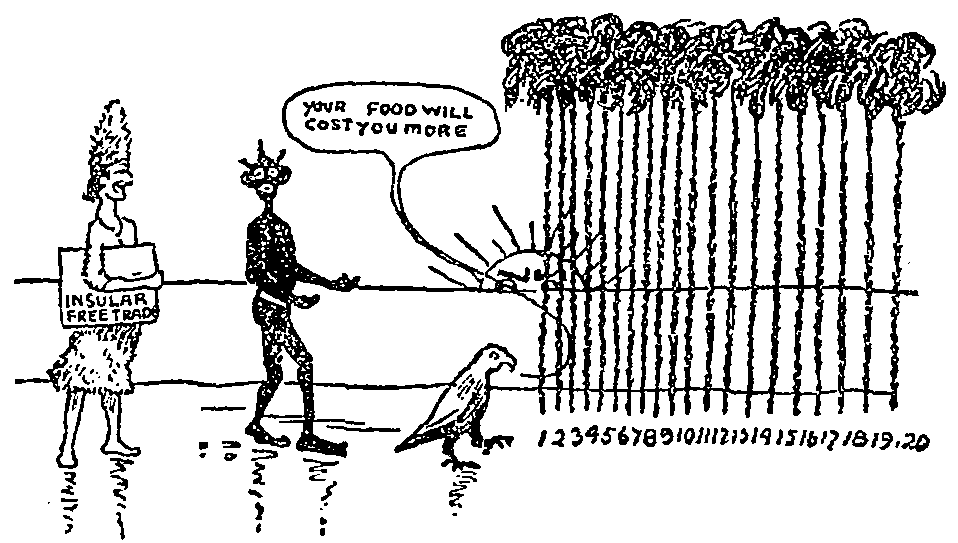
“Friday”, said I to the poor wretch who was following at my heels, “I will make a bargain with you. Cut me down six trees. With the planks of five I will build me a house; with one I will pay thee for thy labour in axe work and in sawing and planing the timber, adding thereto the fruit of all six trees.”
I was well pleased with the gestures of delight with which the good fellow agreed to my plan. In sooth he was an industrious labourer and held the toil light which should return him one whole tree and the fruit of six besides. Nor could I complain at a habitation which would cost me in wages and planks but six trees and their fruit.
But, as good fortune had it, Friday, being without breath from the very violence of his gratitude, had not uttered the word “Done”, which would have completed the bargain between us, before I observed a canoe approaching, and ran hastily to the shore. As it drew nearer I saw that it was laden with fine planks, well planed and selected. The crew, who, contrary to my experience, offered no suggestion of converting me into chops, 6 quickly impressed me with their peaceful intentions.
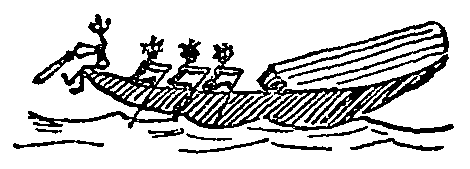
They were dwellers on the mainland, they told me, and existed under a system of protection. The poor knaves seemed well fed and strangely contented, despite the fiscal tyranny under which they groaned. Their chief, a man of great virtue and intelligence, offered me the planks they carried, which were sufficient to build my house, for five trees and the fruit they bore. “How can you afford to do this”, said I, seeing that on this island the same planks prepared by the labour of my workman will cost me six trees and their fruit?”
“Sir”, said he courteously, “it is because in my country, under the blessings of a tariff, we are enabled to make many good planks all the year round and obtain good and steady prices. When we have a surplus we are thus prepared to sell them abroad at cost price or even less, as I have heard do drapers at their sales of goods in the countries of Europe.”
“In other words”, I said with an aspect of merriment, “Jim Dumps.”
“Truly—yet he remains Sunny Jim”, replied the chief with a smile at his own wit. 7
“Well sir”, said I, “you are making me a present of a tree and its fruit for trading with you, since in this island it will cost me six trees to obtain what you offer for five.”
“Describe it as you will”, said he. “Is it a deal?”
“Even so”, said I with a cheerful countenance, for I have ever been right shrewd in business as becomes a member of that good Scotch family of Selkirk. 8 Below I depict the canoe departing with my five trees.
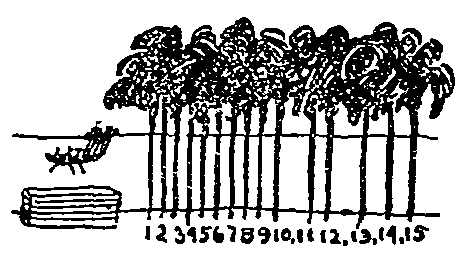
Yet was I grieved to observe that my man Friday seemed angered at my usage of him, making his moan that by my bargain he had been deprived of the tree with which he would have built him a shed, as also the fruit of six trees upon which he had promised himself to live.
I was filled with disgust at the degeneracy of his nature, which seemed, as it were, moving towards some manner of protection. I stood awhile amazed, and afterwards left him, giving thanks in my heart that through my love of Cobden I had been able to save my purse to the extent of one tree and its fruit. A great and notable gain for the wealth of my island!
Having built myself a good habitation from the planks which I had bought, Friday meanwhile contenting himself, poor wretch, with a hole in the sand, I set my mind upon obtaining the wherewithal to make me clothes. Those which I possessed, being of German manufacture, were no defence against the inclement weather which now threatened. Indeed, they were held together only by the pearl buttons which chanced to be of right good Birmingham make. 9 But it did not please me to consider a winter in which buttons were my sole protection from the cold.
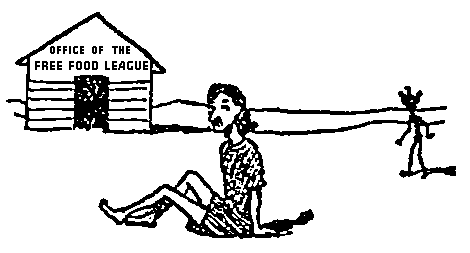
My man Friday, observing the low state of my spirits and the paucity of my apparel, did offer to make me good clothes if I could obtain the wool from the mainland. He was growing thin, as I noticed, and offered the labour necessary for a payment of four trees and their fruit. For myself, I was on the point of agreement, hoping to obtain the wool for two trees, whereby the clothes would cost me six trees and their fruit, when I again saw my friendly savages approaching in a canoe.
They had guessed my plight, and offered me a fine waistcoat, coat, and trousers for five trees and their fruit. Thanking a kindly Providence, I did most readily close a bargain, whereby I again saved a tree and its fruit. Yet were my rejoicings marred by the display of sorrow from my servant.
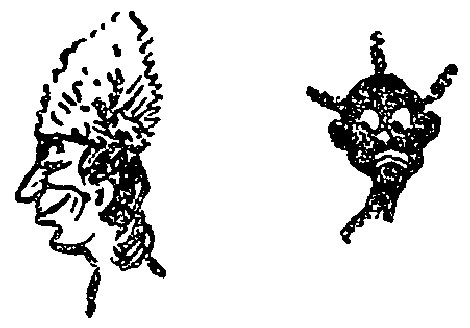
Sitting in front of my new house apparelled in my fine new clothes, I reckoned up my wealth, which stood in this manner:
Item.—Ten trees and their fruit.
Item.—One house.
Item.—One suit of clothes.
But, alas for human delights! As I was making merry over my possessions a loud wail came to my ears. Running, in amaze, to the place I found that Friday, ungrateful wretch, had died of starvation!
This unworthy act of my servant gave me the most desperate vapours. Indeed, I so far presumed as to wonder in my mind if free trade were indeed best for the toilers who lived beneath its rules; though I foresaw not at the time to what ultimate conclusions these speculations would lead me.
Deprived of my servant, I did not linger in the island alone, but with heavy grief accepted a seat in a passing canoe, and was rowed over to the land of the protectionist people.
“I will inquire”, said I, “concerning their system of trade and perchance gain instruction thereby.”
II
I passed an even life for some years amid scenes of great bounty and prosperity. I received high prices and paid good wages. Everywhere around me I observed the common people flourish and the merchants extend their business dealings. At last I saw the truth, and abandoned a fiscal belief that was founded upon the most false superstitions.
This put me in mind of the life I had lived upon the island, where I had diminished my wealth and slain my faithful servant through my Cobden follies. My thoughts ran upon the affair until at length I determined to leave those hospitable shores and again try my fortune upon an island. Yet it was as a Tariff Reformer that I now set out upon a new experiment, taking with me a new servant, whom I designated as Friday II, after the manner of those who race yachts; 10 together with my parrot, from whose absurd cries of “Your food will cost you more” I now obtained much amusement.
By a strange chance I lit upon an island having twenty fine trees and their fruit, and otherwise being of a close similarity to the one which I had previously visited with such sad resultings. Again I was about the building of my house when a canoe from the mainland appeared, offering me planks ready planed and made.
“Sir”, said I to their chief, “I will, indeed, buy your planks for five trees and their fruit, but you must return me one tree and its fruit as duty.”
“Why, sir”, said the man, “you have changed your opinions. We understood that you were one of those that looked only to cheapness. How much will you pay your servant for making these planks which we now offer for five trees and their fruit?”
“I have promised him a tree, wherewith to build a hut, with the fruit of six trees”, said I. “And the trees necessary for the planks I need will be five.”
“Then, sir”, said he, “by rejecting our advances you lose one tree and its fruit.”
“So it might appear”, I said, smiling; “but, as you very well know, I and my servant will be the gainers in the end.”
He seemed confounded by my intelligence, and went quickly aboard his canoe, taking counsel, as I could see, with his fellows as he sailed away.
Observe, now, the wealth of the island, as I now considered it. I was the owner of:—
Item.—One house.
Item.—Fourteen trees of the twenty; also my servant Friday II was fat and well-looking, in possession of—
Item.—One hut.
Item.—The fruit of six trees.
Later, the canoe came again to my island, the chief seemingly not discouraged by my changed opinions. He offered me a suit of clothes for five trees and their fruit, as on a former occasion. But I repulsed him, taking only the raw wool for two trees and their fruit, which wool I gave to Friday II, promising him four trees and their fruit for the making of the clothes. By this it might have seemed that I lost a tree and its fruit, but from my experience I now was of better understanding.
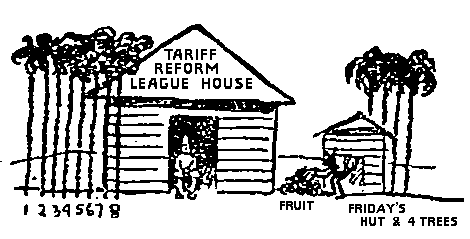
Seated before the door of my hut, which I had converted to a branch of that most noble society the Tariff Reform League, I reckoned up the wealth of my dominions, which stood thus:
Item.—My house.
Item.—Friday’s hut.
Item.—My remaining eight trees, with fruit.
Item.—Friday’s four trees.
Item.—My suit of good clothes.
Item.—Friday’s fruit of ten trees, eaten or stored.
And as I pondered there came to my mind the remembrance of my wretched state on the Free Trade Island. For at this time I had lost my poor servant, and besides had only left me—
Item.—Ten trees and their fruit.
Item.—One house.
Item.—One suit of clothes.
Whereupon I rejoiced with a cheerful countenance that I had renounced the follies of Cobden, seeing that I had obtained great wealth thereby. “Go, thou, oh, my countrymen”, I cried, “go and do likewise.”
Written by Robinson.
Illustrated by Crusoe.
In Daniel Defoe's novel, Robinson Crusoe(1719), the eponymous hero is the sole survivor of a shipwreck that leaves him stranded on a deserted island, where he survives for 28 years.
2For the Cobden Club see here.
3In his Economic notes on insular free trade, published in September 1903, Prime Minister Arthur Balfour used an island to illustrate part of his argument:
Suppose that an island, which had shaped its industrial system on the Cobdenite model, found itself confronted by a world in which every other state adopted an extreme form of protection. What would be the consequence of such a situation to the island itself, and in a less degree to other countries?
This prompted one of his critics, with more imagination than accuracy, to remark:
His pamphlet is an allegory, a parable. He pictures an island; he makes Cobden his Robinson Crusoe; he cuts this island off from the rest of the world by setting up prohibitive tariffs everywhere else, and he then describes its dismal career.
“Mr Balfour on His Island”, The Speaker: the Liberal Review, 19 Sept 1903, p 560
4In Defoe's novel, Crusoe discovers that native cannibals occasionally visit his island, for the purpose of killing and eating their prisoners. Friday is a prisoner who escapes from the cannibals and is helped by Crusoe. When Crusoe is eventually rescued from the island, Friday returns with him to Europe.
In the novel, Friday is so named because that is the day of the week on which Crusoe meets him. Here, the name is associated with the religious tradition of fasting (from meat) on Fridays.
5This refers to the Parrot poems in the Daily Express; although these were unsigned, there are grounds for believing that Fletcher Robinson wrote the majority of them.
6See above.
7“Jim Dumps”,and the native chief's “Sunny Jim”, refer both to a character in advertisements for the breakfast cereal ‘Force’ (see Parrot poem 02) and to the practice of “dumping” (see Parrot poem 02).
8Defoe's novel is believed to have been inspired by the experiences of Alexander Selkirk, a Scottish sailor and privateer who, between 1704 and 1709, spent four years and four months alone on an uninhabited island off the coast of Chile.
9During a speech at Bingley Hall, Birmingham, on 5 November 1903, Chamberlain referred to the state of the pearl button industry in Birmingham:
In the pearl button trade 6,000 work people used to be employed. Today there are about 1,000 and very few of them have full employment. [. . .] it is partly due to the “dumping” of pearl buttons from the Continent into England, and even into Birmingham itself. [. . .] whereas Birmingham used to produce small wares of all kinds, was the largest source of them, now they were got chiefly from Germany . . .
Over the next few months several major Liberal spokesmen—Sir William Harcourt, H H Asquith, Sir Henry Campbell-Bannerman, Sir Edward Grey— referred to “pearl buttons” in their speeches, usually to the accompaniment of laughter from their supporters.
10This is almost certainly an allusion to Sir Thomas Lipton, a wealthy businessman and sailing enthusiast who, between 1899 and his death in 1931, financed the construction of a succession of yachts, Shamrock to Shamrock V, to challenge for the America's Cup. Lipton was unsuccessful with Shamrock in 1899 and Shamrock II in 1901, and fared no better in August-September 1903, when Shamrock III lost in three straight races to the American yacht Reliance.



